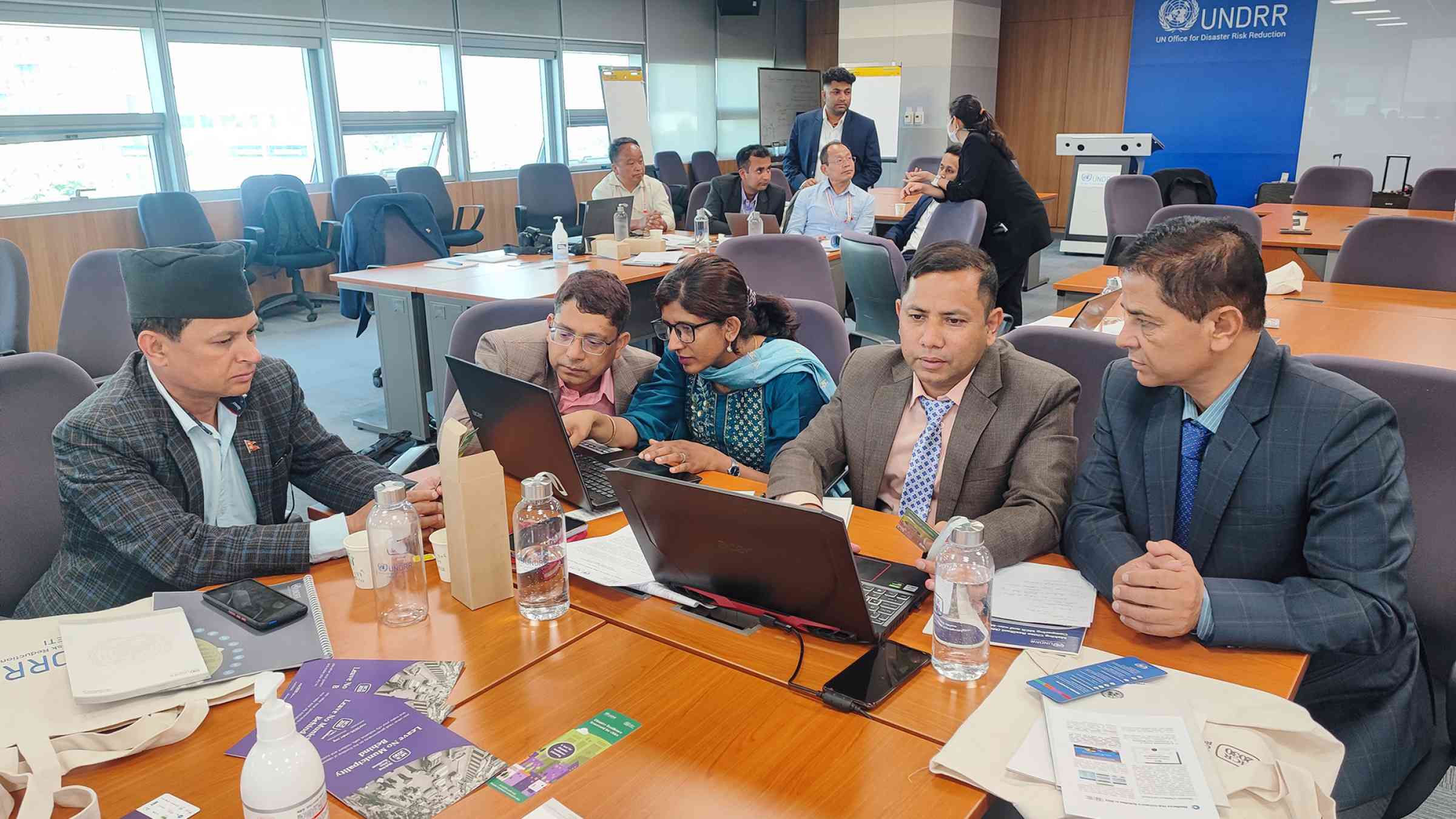Enhancing urban resilience: City-to-city learning in Nepal and Bhutan

A training-of-trainers on urban resilience and ‘Making Cities Resilient 2030’ (MCR2030) for Nepal and Bhutan took place from 15 to 18 May 2023 at the United Nations Office for Disaster Risk Reduction (UNDRR) Global Education and Training Institute (GETI) in Incheon, Republic of Korea. It followed a residential workshop for countries from the South Asian Association for Regional Cooperation (SAARC) on Urban Resilience and MCR2030 in India in December 2022. Responding to the expressed need for more training on disaster resilience, Itahari Sub Metropolitan City in Nepal, along with three other Nepalese municipalities (Ilam Municipality, Suryodaya Municipality, and Nepalgunj Sub-Metropolitan City) and the National Disaster Risk Reduction and Management Authority of Nepal (NDRRMA) participated in this training programme. This collaborative effort aimed to strengthen cooperation between national and local government entities.
The Bhutan Department of Local Government and Disaster Management (DLGDM), which had also participated in the December 2022 regional workshop, along with representatives from the Bhutanese capital city Thimphu, seized the learning opportunity this training offered to reinforce city-to-city knowledge exchange with their Nepalese counterparts and Incheon city as a MCR2030 Resilience Hub.
The training's main objective was to support 27 local and national governments in Nepal and Bhutan in evaluating their progress in disaster risk reduction (DRR) and formulating comprehensive disaster resilience plans. The training fostered closer collaboration between national and local governments in both countries and highlighted urban flooding and forest fires as primary concerns. The participants also had the opportunity to learn about Korea's early warning system. The municipalities planned future training sessions, placing a high emphasis on the involvement of different stakeholders.
Starting with an overview of urban resilience principles, the training explored the Ten Essentials for Making Cities Resilient, the impacts of disaster risk on cities and their connections with the Sendai Framework for Disaster Risk Reduction 2015-2030, Sustainable Development Goal 11 and other global agendas and initiatives. Trainees learned how to identify resilience gaps and needs using the Disaster Resilience Scorecard for Cities and how to prioritize actions. The programme included group exercises on using scorecard results to create and implement resilience-building plans.
Reflecting on the Political Declaration of the Midterm Review of the Sendai Framework, the training highlighted the importance of supporting local authorities in implementing DRR strategies and establishing local DRR platforms. The Declaration further promotes strengthening the role of local authorities in multi-hazard risk governance, providing financial assistance, technical support and capacity development, promoting local ownership through community-based disaster risk management approaches and encouraging participation in the MCR2030 initiative for promoting exchanges between cities.
Following this training-of-trainers, Bhutan's DLGDM committed to advocating for the use of the Scorecard in three additional Thromdes (second-level administrative division), namely, Phuntsholing, Gelephu and Samdrup Jongkhar, where a representative from the capital city Thimphu will serve as a co-facilitator. DLGDM also pledged to integrate DRR budgets into each city's financial plans and promote the Ten Essentials for Making Cities Resilient local resilience guidelines. DLGDM Director Kado Zangpo expressed his belief in the value of MCR2030 and Bhutan's desire to broaden its understanding of disaster management. He emphasized a particular interest in learning from the experiences of other countries, notably those that demonstrate significant progress in implementing the Sendai Framework.
Similarly, following the training at GETI, NDRRMA of Nepal convened a meeting to provide a detailed overview of MCR2030 to its staff members, with representatives from cities contributing valuable testimonials. The commitment to strengthen capacity building in DRR and urban resilience in Nepal remains strong. The authority also encouraged the four cities currently participating in MCR2030 to share their acquired knowledge with other cities and municipalities across the country. NDRRMA's Under-Secretary (Tech.), Sundar Prasad Sharma, lauded the MCR2030 initiatives and underlined the importance of expanding participation to other cities in Nepal. He recognized the programme’s potential in motivating local governments to incorporate DRR into their planning and budgeting. Suryodaya Municipality, for instance, has plans in place to translate the Resilience Scorecard into Nepali and aspires to engage a wider array of city stakeholders in a forthcoming validation workshop. This workshop will be an opportunity to reexamine the assessment process with the active participation of these diverse city stakeholders.
Luna Khatiwada, Head of Environment and Disaster Management at Ilam Municipality in Nepal applauded the training's impact and the emphasis on addressing local issues. She voiced confidence in the potential for elected officials to internalize the knowledge gained and positively influence policies, procedures, periodic plans, and annual action and sub-action plans. She expressed gratitude to MCR2030 for providing this outstanding opportunity for growth and development.

